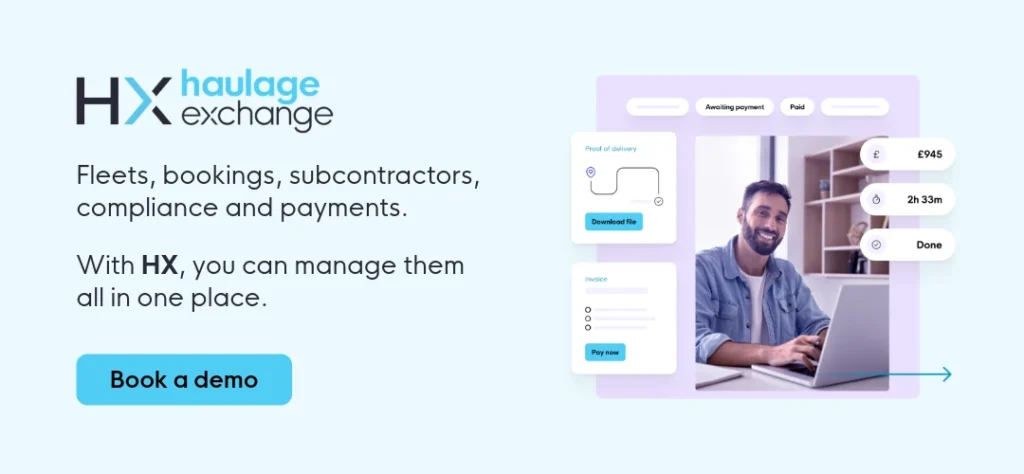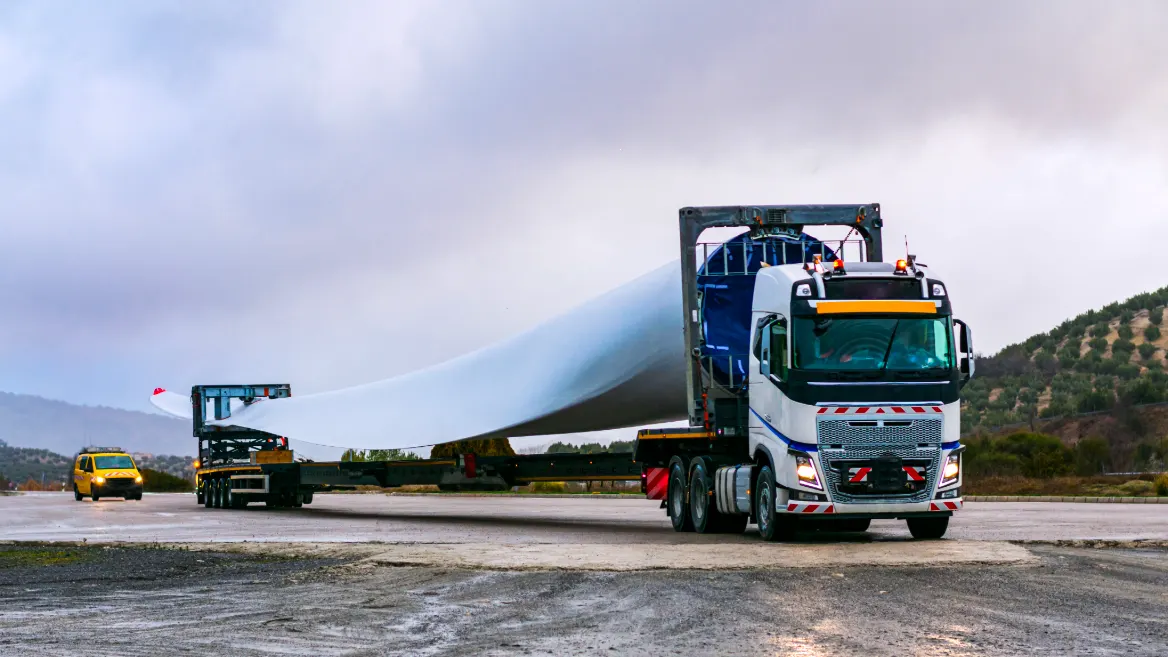How much is the Dartford Crossing? If you’re heading across the River Thames via the Dartford Tunnels or QEII Bridge, it’s a question you’ll want answered before you travel.
In this guide, we’ll explain how much is the Dartford Tunnel Crossing for different vehicles, how the payment system works, and how to avoid any unexpected charges.
What we’ll cover
Fleets, bookings, subcontractors, compliance & payments.
With HX, you can manage them all in one place.
How the Dartford Charge works
The Dartford Crossing includes both the Dartford Tunnels and the Queen Elizabeth II Bridge, and will also include the new Lower Thames Crossing that’s about to begin construction. Instead of paying at a toll booth, drivers now pay the Dart Charge online, by phone, or through an account system.
Cameras record vehicle registrations as you pass through, and payments must be made by midnight the following day.
The Dartford Crossing is part of the M25 but operates as its own charging zone. The charge applies to vehicles using the crossing between 6 am and 10 pm every day (outside of these hours, crossings are free).
If you fail to pay on time, a penalty charge notice (PCN) will be issued to the registered keeper of the vehicle.
Understanding the Dartford Crossing fees helps avoid unnecessary fines and keeps your journey smooth, and is especially important if you’re planning on starting a haulage company.
Dartford Charge rates by vehicle category
So how much is the Dartford Crossing? The answer depends entirely on what you’re driving.
The Dart Charge system splits vehicles into classes based on type, size, and number of axles. Charges also vary depending on how you pay—whether that’s a one-off payment, pay as you go, or a pre-pay account.
As of 1st September 2025, the Dart charges are as follows:
| Vehicle Type | Class | One-off Payment | Pre-pay Account |
|---|---|---|---|
| Motorcycles, Mopeds, Quads | A | Free | Free |
| Cars (incl. trailers), Motorhomes, Minibuses (≤ 9 seats incl. driver) | B | £3.50 | £2.80 |
| Vans / Goods Vehicles / Buses / Coaches with 2 axles | C | £4.20 | £3.60 |
| HGVs, Coaches, Goods Vehicles with more than 2 axles | D | £8.40 | £7.20 |
Motorcycles and quads (Class A)
Motorcycles, mopeds, and quad bikes fall into Class A and are always free to cross.
There’s no need to set up an account unless you want to keep track of your journeys.
Cars, motorhomes, and minibuses (Class B)
Vehicles in Class B include standard cars, motorhomes, trailers, and minibuses with nine or fewer seats (including the driver’s).
- One-off / pay as you go: £3.50 per crossing
- Pre-pay account: £2.80 per crossing
This rate applies in both directions and during chargeable hours. A pre-pay account helps save money for regular drivers and is easy to set up online.
Vans, goods vehicles and buses with 2 axles (Class C)
This category covers vans, light commercial vehicles, buses, and coaches with two axles.
- One-off / pay as you go: £4.20 per crossing
- Pre-pay account: £3.60 per crossing
If you’re operating a fleet of vans or local delivery vehicles, a Dart Charge account helps simplify recurring payments and offers a slight discount.
HGVs and coaches with more than 2 axles (Class D)
Multi-axle goods vehicles, large HGVs, and coaches fall into Class D and pay the highest charges for the Dartford Tunnel.
- One-off / pay as you go: £8.40 per crossing
- Pre-pay account: £7.20 per crossing
These charges can quickly add up for small haulage businesses and large haulage businesses doing multiple crossings per week, so most large fleets use pre-pay accounts to manage costs and reduce admin.
Resident discount scheme
Local residents in the Dartford and Thurrock council areas can apply for discounted crossings.
- £12.50 per year = 50 crossings
- £25 per year = unlimited crossings
You’ll need to set up a Dart Charge account and provide proof of address and vehicle ownership to qualify.
This discount only applies to Class A and B vehicles used for private journeys—not to vans or HGVs used for business.
Dartford Crossing exemptions
Some vehicles are exempt from the Dart Charge entirely:
- Motorcycles and mopeds (Class A) – always free
- Drivers with disabled tax exemption – free, if the vehicle is registered for free DVLA vehicle tax
- Emergency vehicles, military vehicles, and special permit holders – may also qualify under certain conditions
If you’re not sure whether your vehicle qualifies, check the DVLA tax status or contact Dart Charge support before travelling.

Chargeable hours and overnight exemptions
Unlike many toll roads, the Dartford Crossing doesn’t charge 24/7. Charges apply between 6 am and 10 pm daily, seven days a week. If you cross overnight, between 10 pm and 6 am, you won’t pay anything.
Overnight exemptions are particularly useful for logistics companies that schedule deliveries outside peak hours.
Some HGV speed restrictions in the UK may also make overnight runs more efficient, combining faster journeys with cost savings.
Public holidays don’t affect Dart Charge operating hours, since the same timeframes apply whether you’re crossing on a weekday, weekend, or holiday.
All payment methods explained
The Dart Charge offers several ways to pay, giving drivers flexibility depending on how often they use the crossing.
Missing a payment can quickly turn into a fine. So, knowing your options is essential.
- Pre-pay account and top-up plans
- Single-payment and pay-as-you-go options
- Phone, post, and retail payments
- Discounts for local residents
Pre-pay account and top-up plans
For regular users, a Dart Charge account offers discounted rates. You pre-load funds into your account, and charges are deducted automatically when you cross the Dartford Tunnel or the Queen Elizabeth II Bridge.
This system helps avoid missed payments and reduces the risk of receiving a penalty charge.
Business accounts allow fleet operators to manage multiple vehicles easily. For haulage companies, this simplifies record-keeping and helps avoid payment errors that lead to fines.
Having all vehicles linked under one account makes managing busy fleets far more efficient.
Single-payment and pay-as-you-go options
If you only use the Dartford Tunnel crossing occasionally, you can make a one-off payment each time you travel.
Payments must be made by midnight the following day to avoid penalties. The easiest way to pay is online through the official Dart Charge website or app.
Some drivers set reminders on their phones to ensure payments aren’t missed after using the crossing. This simple habit can prevent costly fines and unnecessary stress.
Occasional users should always double-check that payments have gone through successfully.
Phone, post, and retail payments
If you prefer not to pay online, the Dart Charge can be paid by phone using the dedicated customer service number. Some payment locations also allow in-person payments at Payzone retailers, offering flexibility for those without internet access.
While post is technically an option, it’s slower and not recommended for payments close to the deadline.
International drivers can also use these methods to stay compliant. The variety of payment options ensures that overseas visitors don’t accidentally fall foul of UK toll charges.
These alternative channels provide backup solutions for anyone unable to access the website or app.
Discounts for local residents
Local residents living within designated areas near the crossing can apply for discounted Dart Charge rates.
Eligible drivers pay just £25 annually for unlimited crossings, which is a major saving for daily commuters. This makes a real difference for locals using the crossing frequently.
To qualify, you must live within one of the defined postcodes surrounding Dartford and Thurrock. Proof of address and vehicle ownership is required during registration.
Applications must be kept up to date if you change vehicles or move house.
These discounts only apply to private cars and motorcycles registered to the resident. Commercial vehicles used for business purposes are not eligible for the resident scheme.
Businesses must still pay full Dart Charges based on their vehicle classification.
Penalty charges and appeals process
Failing to pay the Dart Charge on time results in a penalty charge notice (PCN). The fine for a first offence is £70, reduced to £35 if paid within 14 days.
If left unpaid, the charge increases to £105.
How much is the Dartford Crossing fine if you ignore it completely? The answer is costly: unpaid fines may be referred to enforcement agents, adding fees and legal costs on top of the original toll road penalty.
If you believe a PCN was issued in error, you can appeal online or by post. You’ll need to provide evidence supporting your case, such as proof of payment or vehicle exemption.
Appeals must be submitted as soon as possible, as late appeals are unlikely to be accepted.
Vehicle exemptions and special rules
Certain vehicles are fully exempt from paying the Dart Charge. These include emergency vehicles, military vehicles, and registered disabled drivers using vehicles exempt from road tax.
Electric vehicles are not automatically exempt from the Dart Charge. Unlike some low-emission zones, all vehicle types are subject to payment based on their classification.
EV owners should check carefully before assuming they are exempt.
Oversized loads may require additional permits to use the crossing but still attract the standard Dart Charge fees.
It’s important to check size and weight limits before planning your route. This is especially important if you’re operating large HGVs.
Dartford Crossing FAQs
Is the Dart Charge £3.50 each way?
As of September 2025, the standard Dart Charge for cars is £3.50 per crossing during chargeable hours. This applies in both directions – northbound and southbound. Pre-pay account holders pay a reduced £2.80 rate per crossing.
Do you pay both ways on Dartford Crossing?
Yes, the Dart Charge applies to each individual crossing. Whether you cross northbound or southbound, you’ll pay the applicable fee every time. It’s not a return or round-trip charge.
Is Dartford Crossing free on Sunday?
No, Sunday is treated the same as any other day. The Dart Charge applies every day between 6 am and 10 pm, including Sundays. There are no special exemptions for weekends.
Is Dartford Crossing still free after 10pm?
Yes, the Dartford Crossing is free for all vehicles between 10 pm and 6 am. This overnight exemption applies seven days a week. Businesses often schedule late-night freight to benefit from these savings.
Can I pay Dartford Crossing a day late?
No, payments must be made by midnight on the day after your crossing. Missing this deadline results in a penalty charge notice being issued. It’s always best to pay as soon as possible after travelling.
What is the fine for the Dartford Crossing?
The initial fine for missing a Dart Charge payment is £70. If paid within 14 days, it’s reduced to £35. If left unpaid, the penalty can rise to £105, plus potential additional enforcement costs.




